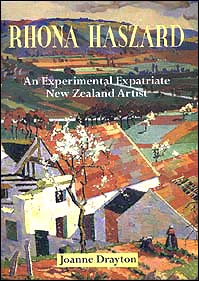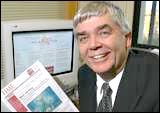Reviewed by Jacqueline Steincamp – 11/2/00
“The Unforgiving Minute: A Life of Rudyard Kipling” by Harry Ricketts. Published by Chatto and Windus 1999
We all know of Rudyard Kipling, but Harry Ricketts? Who is he? How come a new Zealand author has written the life of a man sometimes sneered at as the ‘bandleader for the British Empire’.
Ricketts is one of those ex-Colonial Brits who have settled in the “last,
loneliest, loveliest, exquisite, apart”. That’s New Zealand, as described
by Kipling. He’s a prolific poet, a novelist, reviewer (hear him with Kim
Hill or in The Listener ) and editor. His main bread comes from lecturing in history at Victoria University.
He has the background for the task. He always thought his father, a British Army officer, the sort of person Kipling wrote about. He himself
spent much of his childhood in the East, and, like Kipling, was schooled in
England, not at Kipling’s old school, but at Wellington College, Berkshire,
which Kipling chose for his son John. It was a Wellington College teacher
who first interested Ricketts in Kipling, and this book is an expansion of
his university thesis.
An absorbing reinterpretation of Kipling and his work In his absorbing reinterpretation of Kipling and his work, Harry Ricketts
brings his subject vibrantly alive, leads us through his confusing childhood, and by the use of many quotes from Kipling’s works throughout his life, illuminates his genius, his self-doubts, his contradictory passions. his overwhelming patriotism – and ambivalence towards England and
the English (the English were inclined to let down his vision of an ordered
society – run by white Gods – those same gods of his youth who ruled India); his hatred of liberals, reformers, communists, Germans, Jews and
Chinese. Especially Chinese. How much did his extraordinary and ignorant
views so attractively presented – contribute to the British xenophobia – and our own fears of other races?
The strength of this biography is the way that Ricketts has interpreted Kipling’s life and his works. His focus on Kipling’s early life is first
class. He writes with sympathy and perception, summing up the complexities
of Kipling’s nature. The superb preface touches on the reader’s half-guilty sense of pleasure when reading Kipling and the intimate relationship that he very often has with his readers.
Its weakness is Ricketts’ inadequate treatment of the last half of Kipling’s life. The last seventeen years are covered in a couple of chapters, and some excellent later stories are ignored altogether.
The most popular author of his time By the time he was thirty, Rudyard Kipling (1865-1936) had scaled the heights of literary fame with his Plain Tales from the Hills’,The Jungle
Books’, Kim and other wonderful Indian tales. He was undoubtedly the
best loved and best paid author of the time.
When he died, his death was a national event – but not a literary one. No
writers were among the pallbearers who were in the main, politicians, bureaucrats and military men. Few writers turned out to see his ashes interred at Westminster Abbey. Evaluations of his life’s works were guarded, with Edwin Muir commenting that Kipling was inclined to look on society in general as a larger edition of the army. Thus, to him, reformers had a suggestion of insubordination.
Unusual soil The book opens with a dig into the unusual soil from which Rudyard Kipling
emerged. Both parents came from talented large families with strong connections to Methodism and Wesleyism. Few of them remained believers,
though Rudyard’s Uncle Frederic became president of the Wesleyan Conference. His mother Alice, felt so antipathetic towards the church that she burnt a lock of John Wesley’s hair. “See – a hair of the dog that bit us!” – she cried as she cast it into the flames.
The intelligence and stature of the subject’s uncles and aunts – people like Edward Burne-Jones, Edward Poynter – and their circle of celebrated friends, must have impacted on young Rudyard, and Ricketts shows evidence
of a demanding nature, a great sense of self and a feeling of being special.
His first six years of life in India — the little Sahib, Friend of All The
World, loved and indulged by Indian servants, living in the heart of the British Empire, the Raj – marked him for ever. As did the next five.
The House of Desolation Like many English parents living in India and “other uncivilised places”,
Alice and Lockwood Kipling brought their children back to England for a proper English upbringing and education. Rudyard was six, his sister, Trix, was four. It was 1871. They boarded with strangers and were not to
see their parents for five years.
At first things went reasonably well in what Rudyard later called “The House of Desolation”, but following the owner’s death, the Kipling children
were left to the small mercies of his wife. A narrow-minded, sadistic woman, with a strong Evangelical bent for punishment, she acutely disliked
Rudyard. He shared a room with her son Harry, who joined with his mother
in making Rudyard’s life miserable. So this sad little boy turned to the
world of private imagination and memory and played secret games with Trix –
wonderful groundwork for a writer.
Ricketts believes that this unhappy period created both an understanding of
hatred within Rudyard and the capacity to hate. Hate became part of his character. It may also have been the source for his great understanding and sympathy for orphans, for the displaced and oppressed.
Ricketts cites the story Baa Baa Black Sheep (p. 117) as illustrating how much these five years damaged him. The two children, Punch and Judy, are finally reunited with their parents and Punch tells Judy “It’s all different now, and we are just as much Mother’s as if she had never gone.” But the voice of the narrator intervenes with: “Not altogether, O Punch, for when young lips have drunk of the bitter waters of
Hate, Suspicion and Despair, all the Love in the world will not wholly take
away that knowledge, though it may turn darkened eyes for a while to the light, and teach Faith where no Faith was.”
Were it not for holidays at the Burne-Jones’, with access to a wonderful library, fascinating relatives and guests, and every opportunity for joyous, unfettered creativity, Rudyard’s breakdown in 1876 might have come
much sooner.
Back in Mother’s arms The crisis brought his mother back to England. A period of great happiness
and development followed, living in the country with his mother and sister,
with relatives to stay – and sometimes cousin young Stan Baldwin. Boarding more happily in London, museums, galleries, where he began to appreciate that both of his parents wrote, and had their work published. The idea that it was OK to expose one’s thoughts, to influence others through one’s writing – and make a living at it – began to grow in young
Ruddy’s mind.
By 1871 he was well prepared for secondary school, arriving at the United
Services College widely read and with a good grasp of maths. He had mastered the 1st four books of Euclid, the 1st 12 rules of algebra, and in
Latin had completed the second book of Caesar. Not bad for a 12 year old.
And what was he like? – “a cheery, capering, podgy little fellow, as precocious as ever he could be. Or rather, a broad smile appeared with a
small boy behind it, carrying it about and pointing it in all directions.”
Ruddy made friends, and created the basis for the much later Stalky and
Co – – though their fictional adventures, sometimes cruel, bore little
relationship to the minor escapes of Dunsterville, Beresford and Kipling.
A career in writing Not good enough for Oxbridge, he was nudged towards his future career by his USC headmaster who revived the defunct school magazine with Rud as his
assistant. This spurred his father into finding him a newspaper job in India
as editorial assistant on a small English paper in Lahore. Here he learnt
the realities of the free press … his paper followed the government line
because the company had the government printing contract. The Indian heat
and the constraints of a small white society began to exasperate him, and
his anonymous poem attacking government policy was probably his first political move. He joined the Punjab Volunteers – and was asked to resign.
He was writing more and more, with an ever-increasing sympathy for the Other Ranks. February 1884 saw his first real Indian story, the marvellous Gate of the Hundred Sorrows with what came to be the instantly recognisable Kipling voice – so straight forward that you think
it must be true … “This is no work of mine. My friend, Gabral Misqitta,
the half-caste, spoke it all …”
Visit to New Zealand His visit to this country in 1891 was an unqualified success. He fell in
love with us New Zealanders, and with the country.
“Wellington opened another world of kindly people … large, long-eyelashed
and extraordinarily good-looking…” he wrote. Take a bow, you Wellingtonians!
Interestingly, he thought New Zealand’s greatest role would be in literature, and that women writers would play a determining role in our literature. But that the country (‘one big encumbered estate’) would need
to become economically independent before this happened.
Within the outer shell … His was a long life considering some personal tragedies and disasters, plus
a long-burning duodenal ulcer which eventually killed him. It was a life
in which he – the Sahib – was the living embodiment of Lord Acton’s famous
aphorism – “from the outside every man’s home is his castle – from the inside it is often more like his nursery”. His wife Carrie ran all his affairs. He left all management details to her and could not have caught a
train without her.
His love life always appeared meagre, though he and Carrie did manage three
children. The deaths of their favourite daughter, the shining Josephine,
at age seven; and of his beloved son Jack in the trenches, were body blows
from which he may never have recovered.
He became more and more involved in politics, supporting the Conservatives
and tub thumping throughout the war. His later work was very often polemical, sometimes nonsensical, and often just plain boring. His earlier
sympathy for The Other Ranks turned to disgust as what he saw as the greed
of working men in wanting some of the jam too.
Had he died in 1899, as he very nearly did, Ricketts suggests that his reputation might now be greater. At that stage his best work had nearly all appeared – all those wonderful stories and poems that so many of us loved as children. So, when his death finally came in 1936, he was honoured more as an English institution and patriot than as a great man of
letters.
And of all the Kipling quotes in this book, one I had not known and that so
appeals to me – because I’ve just returned from England – is this:
“To me it is a land full of stupefying marvels and mysteries …a day in the car in an English countryside is a day in some fairy museum where all the exhibits are alive and real and yet none the less delightfully mixed up with books. For instance, in six hours, I can go from the land of the Ingoldsby Legends by way of the Norman Conquest, and
the Barons’ War into Richard Jefferies’ country, and so through the Regency, into Gilbert White’s territory …. in England the dead, twelve coffins deep, clutch hold of my wheels at every turn, till I sometimes wonder that the very road does not bleed. That is the real joy of motoring
– the exploration of this amazing England”.



